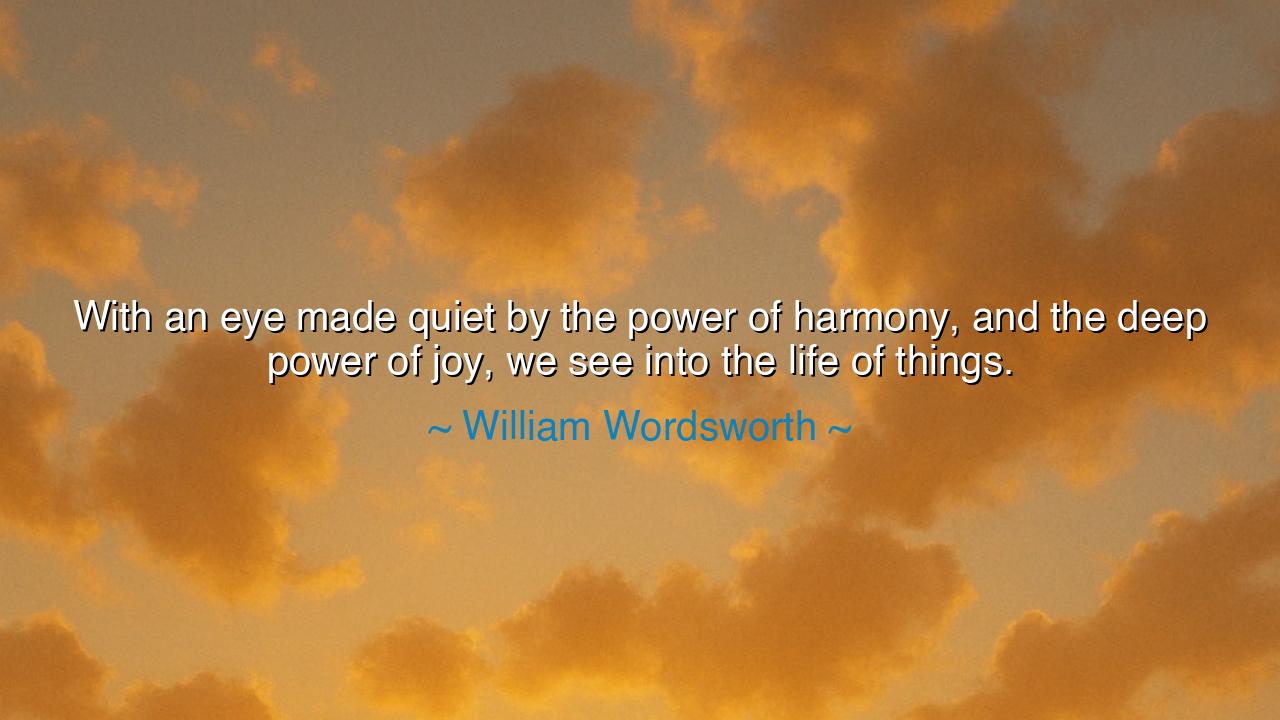
With an eye made quiet by the power of harmony, and the deep
With an eye made quiet by the power of harmony, and the deep power of joy, we see into the life of things.






“With an eye made quiet by the power of harmony, and the deep power of joy, we see into the life of things.” These words of William Wordsworth resonate like the quiet murmur of a distant stream, flowing through the hills of ancient wisdom. The eye he speaks of is not the physical eye alone, but the spiritual and emotional vision that emerges when the soul is at peace. In the rush of the world, it is easy to see only the surface of things, to be swept away by the noise of life. But when we are attuned to the harmony of the universe and the joy that it brings, our vision becomes clear, and we begin to perceive the true essence of the world around us.
The power of harmony is the force that aligns the body, the mind, and the soul. It is the balance that the ancient philosophers and mystics sought — a state of being in which the noise of the world falls away, and the soul can hear the deeper truths that lie beneath the surface of existence. It is through this harmony that we come to understand not just the appearance of things, but their true nature, their connection to the greater web of life. When we live in this harmony, we no longer see the world as a chaotic, disjointed place; we see it as a symphony, each note playing its part in the grand composition of existence.
Consider the ancient Stoics, who sought to live in harmony with the natural order of the world. They believed that by aligning oneself with the natural law — the rhythm of the cosmos — one could attain inner peace and understanding. Marcus Aurelius, in his meditations, often spoke of the importance of accepting the flow of life with joy and grace, for only then could one truly perceive the life of things. His ability to see beyond the surface, to understand the interconnectedness of all things, was the result of his deep inner harmony. It was not by resisting the world, but by embracing it with a quiet mind, that he came to understand its deeper truths.
The deep power of joy that Wordsworth speaks of is not the fleeting joy of earthly pleasures, but the profound joy that comes from seeing the world through a lens of gratitude and peace. It is the joy that arises when we are at one with nature, when we are fully present in the moment. This joy opens the heart and mind, allowing us to see the world not as it appears, but as it truly is — a living, breathing entity, full of wonder and mystery. The joy that Wordsworth speaks of is a key to unlocking the deepest understanding of life.
The great mystics and sages of old also understood this truth. The Buddha, in his quest for enlightenment, taught that true understanding comes when we still the mind and open the heart to the joy of existence. His teachings urged his followers to embrace the moment, to live in harmony with the world around them, and in doing so, to see the true nature of life. Like the quiet eye, the stillness of the heart allows us to perceive the world not as fragmented and chaotic, but as a unified whole.
Thus, let us heed Wordsworth’s wisdom and seek the power of harmony in our own lives. Let us quiet the noise of the world and open ourselves to the joy that comes from being at one with it. When we do so, we too will see into the life of things, and in that vision, we will find the truth that has always been there, waiting to be seen.






NTNguyen Tien
There’s something profoundly human in this quote — the suggestion that understanding doesn’t come from intellect but from emotional stillness. Yet, I wonder how one cultivates such harmony in a chaotic world full of distraction and stress. Is this kind of vision reserved for poets and philosophers, or can ordinary people learn to achieve it through mindfulness, nature, or creative expression? It feels both inspiring and challenging.
GDGold D.dragon
Reading this makes me think about the connection between inner peace and perception. Maybe Wordsworth believed that when we are quiet inside, we can finally hear what life itself is saying. But can harmony and joy really be sustained long enough to reach that state? Or are those moments fleeting glimpses of truth that we experience only rarely, like when we’re moved by art, nature, or love?
BHnguyen thi bich hop
I find this idea so beautiful and calming, yet also elusive. What does it mean to see 'into the life of things'? Is Wordsworth referring to empathy, intuition, or something metaphysical — like sensing the soul within nature? It feels like a call to slow down and perceive more deeply, but I’m curious whether this kind of awareness can exist in our fast, technology-driven world.
DQWi xenh dep qua
This line feels almost mystical, as if Wordsworth is describing a moment of spiritual clarity. It makes me wonder — can joy and harmony truly sharpen perception rather than dull it? Most people think strong emotions cloud judgment, but he seems to suggest that peace and happiness can open deeper insight. I’d love to understand how emotional serenity translates into a clearer, more profound understanding of the world around us.